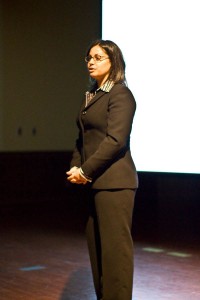By Juliana Fidler
Correspondent

College students should consider getting Ph.D.’s to further their careers, according to a presentation, “Transitioning to a Ph.D. Student; Could this Route be for You?” by Danielle Lombardi, a 2003 alumna of the College, on Wednesday, Oct. 21 in the Library Auditorium. The event was part of the Young Alumni Lecture Series, sponsored by the Honors Program and the office of Academic Affairs.
“Primarily the Lecture Series is to encourage our current undergraduates to go to graduate school. Sometimes they need to be shown that there are some really grand opportunities in the northeast region,” John Sisko, associate professor of philosophy and coordinator of the Honors Program, said.
Lombardi graduated from the College in May 2003 with 150 credits and a minor in criminal justice studies, and originally wanted to work for the FBI. She planned on using her degree in accounting in this way because there was “a lot of fraud being discovered with accounting,” she said.
However, she went a different route. After graduating from the College, Lombardi worked at PricewaterhouseCoopers for two years and JH Cohn for three years.
Her employment experience included 80-hour work weeks as well as constant travel, and she decided that she wanted a change. She decided to apply to graduate school. Lombardi received her B.S. in accounting from the College and is currently working toward her Ph.D. at Rutgers Business School. Once she graduates, she’d like to work as a tenured professor and continue her research in behavioral auditing.
Lombardi has given presentations at conferences for organizations like the American Accounting Association and the World Congress of Accounting Historians.
“There’s still a lot of traveling, but it’s more glamorous traveling,” she said, noting that her previous job sent her to places like El Paso, Texas. “There’s not a lot to do in El Paso.”
“In industry, they don’t value a Ph.D.,” she said. For the accounting graduate program, she estimated “90 percent of the people go into academics.”
She emphasized the importance of research in the graduate program. “The heart of your Ph.D. is your research,” she said.
During graduate school, “you have to start immediately networking,” she said. “You have to get people to know your name, know your work.”
Lombardi began her research early on during her undergraduate years at the College. She co-authored a paper entitled “Auditor’s Independence: An Analysis of Montgomery’s Auditing Textbooks in the Twentieth Century” with Hossein Nouri, professor of business.
Lombardi’s other completed work is called “Bridging the Gap: A Study of Audit Fee Determinants Currently Used by Public Accounting Firms Compared to Prior Studies and Empirical Results.” In this study, the companies she had worked for helped her by completing surveys. She is still working on a study called “The Future of Audit: A Modified Delphi Approach.”
She offered a program for the first two years of the accounting Ph.D. process, which requires 72 total credits. Part of this is statistics classes.
Lombardi then explained the process after the first two years — the qualifying examination and the dissertation.
The first is a two-day exam. The first day is a literary review, in which students are given a series of questions and have to search for related materials. During the second day, students have to read papers and act as a “referee.” Lombardi facetiously described the experience as “two days of fun.”
The dissertation has two steps. Students must come up with a proposal and then defend it in front of a committee. Students work with the committee to develop the study.
Although less than three percent of applicants are accepted”to Rutgers Business School, “some other programs are much more cutthroat and competitive, Lombardi said. “I found Rutgers to be a lot more encouraging.”
Accounting, Lombardi said, is the second highest-paid Ph.D.
“There’s such a shortage, and the demand is so high,” she said. “I’m hoping that will work in my favor.” She said that a lower-end starting salary of recent graduates of the program is $150,000.
Namrta Bhurjee, senior accounting major, and Carolina Moreno, senior criminology and justice studies major and accounting minor, were impressed by this life and salary.
“I thought (Lombardi’s presentation) was very informative,” Moreno said.
“They should have more of these for all majors, not just accounting,” Bhurjee said.
According to Sisko, the areas covered last semester were history, classical studies, English, biology, psychology and engineering.






